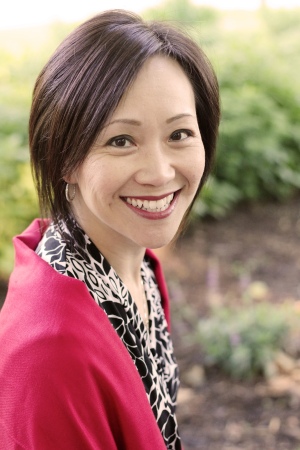A few months ago, I wrote a post that quoted Kathy Khang: ““But to find your voice can be dangerous because you have to choose things and take risks and speak.” Then I waxed poetic about her bravery, amazed that she might find it hard to use her voice.
Kathy was kind enough to stop by and admit that she had trouble seeing herself in my description. “Sometimes I wonder if the pushback and the doubt ever go away,” she said. Since I also have felt befuddled when people have called me “brave,” I wanted to talk with Kathy about bravery, using your voice, and why it’s so important that we dream our wildest dreams.

In the book you collaborated on, More Than Serving Tea, you mentioned that when you had a conversation with your husband about your “wildest dream”, you were annoyed with yourself when you couldn’t come up with one. Why did it annoy you?
It annoyed me because I thought that I had been doing all the right things as a Christian wife, mother, and woman. I loved my children, I balanced vocation and family, and I tried to support my husband.
So the conversation caught me off guard. I realized I wasn’t dreaming dreams for myself. I was praying my three children would discover how God dreamed for them—but I wasn’t doing the same for me.
Do you know what your wildest dream is now?
Well, some of my wildest dreams are related to my children. For example, my oldest is going to study dance; I would love to travel to see her dance or choreograph on a major stage.
I also dream about writing more, seeing more of the world, and writing out of that experience.
What difference does it make in your day-to-day life to know what your wildest dream is?
When you put words to your dreams and put them out there, you invite accountability.
I think that accountability is part of why I hesitated to name my dreams.
If I hear someone say, “I’m going to write a book,” I think, Really? And if I say it, I wonder what people will think of me. I must decide: am I going to live into that accountability?
Naming a dream isn’t a childhood fantasy. It’s believing that our dreams are rooted in the reality of God.
It’s a lot easier to be undisciplined.
In your book, you mentioned that culturally and personally, you generally avoid conflict and “swallow your suffering,” as you put it. And yet you stirred up a hornet’s nest by spearheading an open letter to the Evangelical church regarding racist stereotypes against Asian-Americans, and even directly aded Rick Warren about it. That’s a lot of suffering out loud and walking right into conflict. How did you feel empowered to go against your temperament in that situation?
As I’ve gotten older, and had a clearer sense of calling, I see that I am averse to conflict for conflicts’ sake.
But in that situation, and others shortly after it, we weren’t really worried about conflict. We didn’t say, “Oh, no—this is going to make waves.”
Sure, that crossed our minds, but we weren’t looking for conflict. Instead, we wanted to enter into the truth of what the Gospel is, and what the church needs to be communicating. Those stereotypes aren’t it.
Is there a connection between knowing your wildest dream and speaking truth to power?
I feel lucky to know that there is a connection, and that my passion and ability to write and communicate is directly related to having leverage to speak out into issues of justice. I’m fortunate to have consistent Internet access, and an understanding of the networks available to me. I know that doesn’t come together so neatly for everyone.
Because of that, I need to steward my leverage.
If I have leverage, how can I not write about something that comes out on social media that impacts millions of people one way or another? How can I dismiss my little audience and say, “What I write has no impact,” or “What I say won’t make a difference”?
Perhaps making a difference isn’t the point. The point is to be faithful to the dream God has given us.
This boldness is the whole thrust of Scripture: God says, “I’ve given you this vision. Now, what choice are you going to make?”
That’s when we must have the discipline to follow through.
If a woman asked you how to become brave like you, what would you tell her? (I ask this knowing that you don’t always see yourself as brave).
I would ask her if she knows who her cheerleaders are, who her supporters are, who will pray with her, cry with her, be angry with her, or be honest with her. And if you can name one or two people who will do that for you, that’s the first step.
What practices grounded you as you were enmeshed all that conflict a few months ago?
I did my best to walk away from the computer and say, “Goodnight, Computer.”
I had conversations with Helen Lee and Daniel So during the controversy, but I couldn’t read all the comments and follow its trajectory. I had to shut the computer down down.
I talked about it with my husband and kids. It was interesting: my kids are old enough to be on social media themselves. They knew that Mom was involved in something, and wondered why Rick Warren was so upset.
So it was important to communicate well with my family about why I was speaking out. It was important to answer their questions, to talk about why people were saying I was wrong. Those conversations grounded me.
I also went back to my support network in my neighborhood: a mix of believers, not-believers, not-sures, and let them in on what was happening. Because they weren’t in the same social networks, their perspective was helpful.
Finally, I prayed a lot, and I sat quietly.
I’m an extrovert, so sitting quietly is hard for me.
But in those few days, I found myself really quieting my heart. I needed to know what I was feeling and communicate that to God. It isn’t fun being called all sorts of names by people you don’t know. And it’s hard to know all those comments are out there, forever, for my kids to read. I had to be able to tell God: “This hurts. I’m embarrassed. I’m afraid. I don’t like being called a troublemaker.”
Now that some time has passed, how do you feel about the whole thing?
The whole experience reminded me that in the church we are not yet reconciled fully with one another. We are reconciled with and through Christ—yes. But with each other? That’s a whole other problem.
That is horrible for the church. It’s embarrassing.
But there is a rich diversity of voices out there, and some are trying to learn from each other. There is a way to reconciliation. It’s a long road, but it’s worth it.
Image courtesy Angela of Tweedledee Designs
 Kathy KyoungAh Khang is currently serving as a regional multiethnic ministries director with InterVarsity Christian Fellowship (IVCF)/USA. Kathy is one of the authors of More Than Serving Tea (InterVarsity Press, 2006), and she continues to write on her personal blog More Than Serving Tea. She is also a contributing blogger at Sojourners, as well as Next Gener.Asian Church. Kathy and her husband Peter Chang are honored to be the parents of Bethany, Corban, and Elias.
Kathy KyoungAh Khang is currently serving as a regional multiethnic ministries director with InterVarsity Christian Fellowship (IVCF)/USA. Kathy is one of the authors of More Than Serving Tea (InterVarsity Press, 2006), and she continues to write on her personal blog More Than Serving Tea. She is also a contributing blogger at Sojourners, as well as Next Gener.Asian Church. Kathy and her husband Peter Chang are honored to be the parents of Bethany, Corban, and Elias.













 The Danger of Losing Purpose When We Hustle
The Danger of Losing Purpose When We Hustle